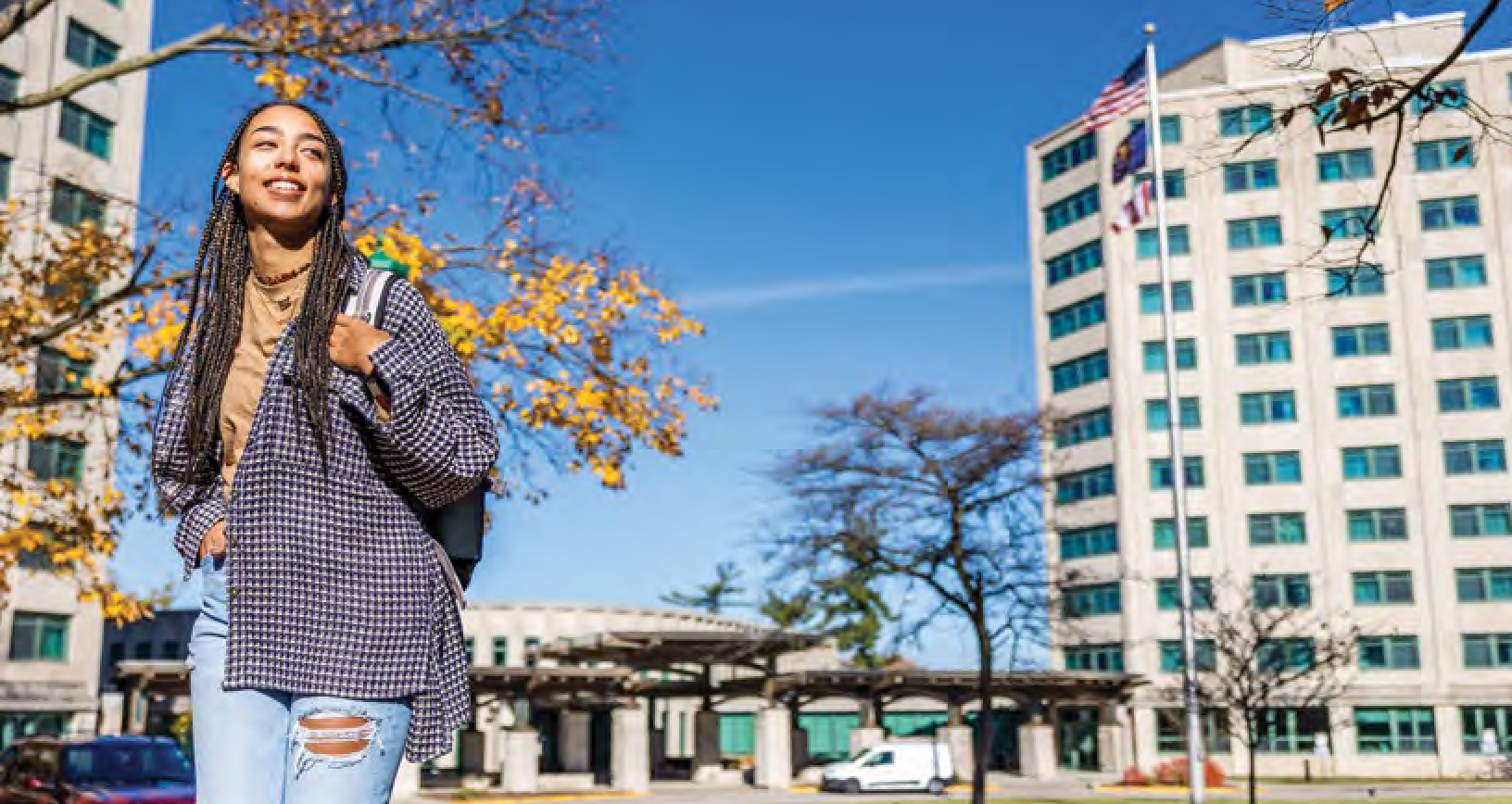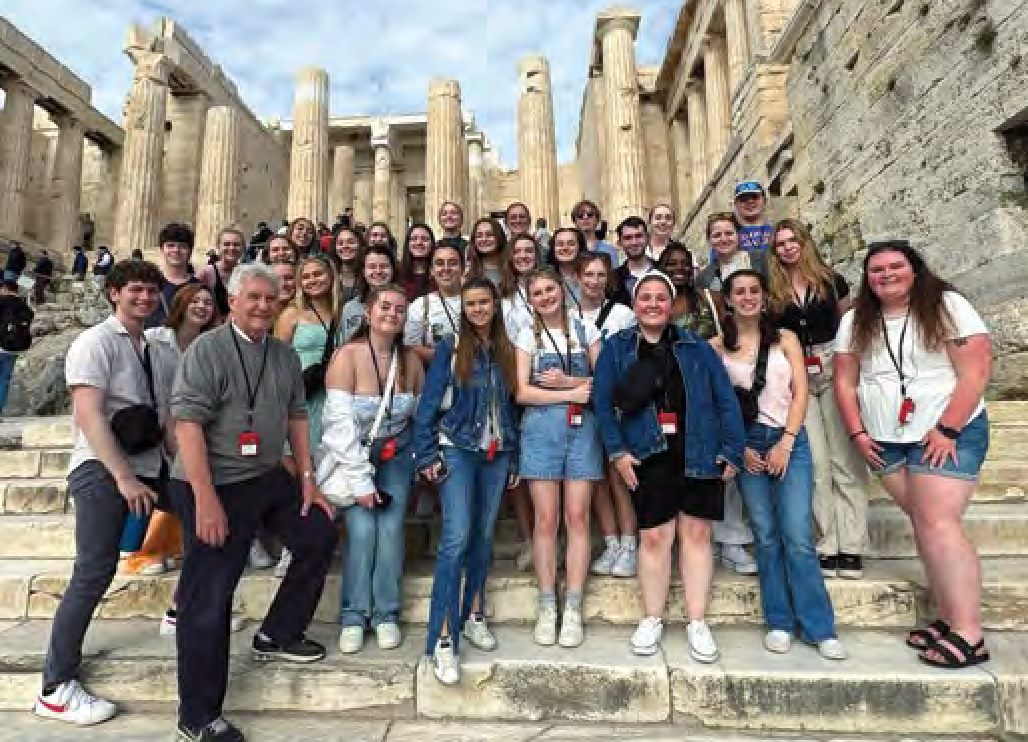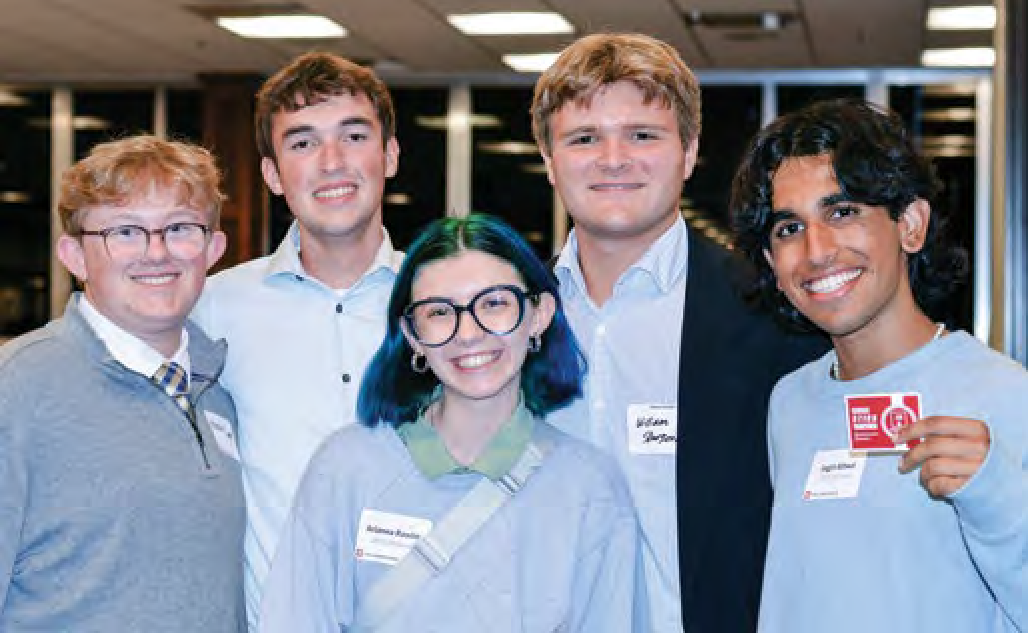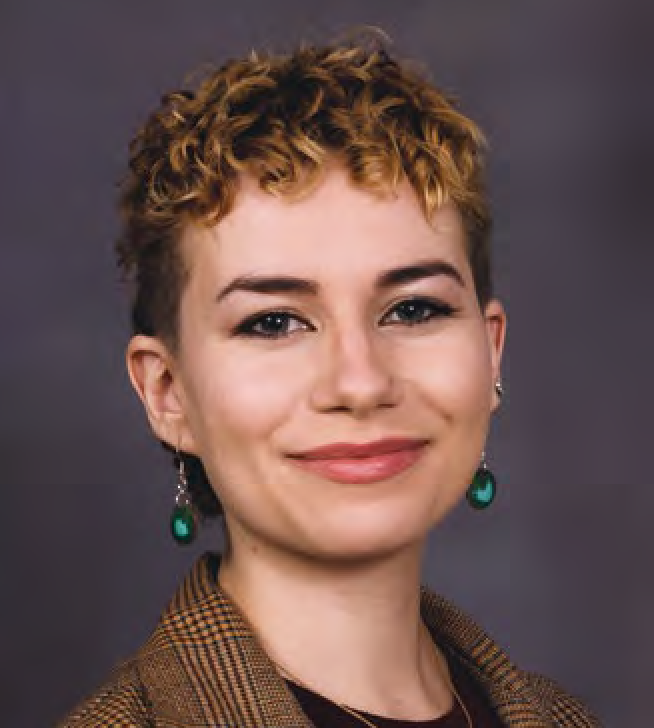3 Civic Leaders Center celebrates 10 years
 BY EMILY COX
BY EMILY COX
In 2013, amid the sticky August heat of Welcome Week, 66 freshmen crowded onto the first two floors of the newly ren- ovated Briscoe Residence Center to take part in an ambitious experiment: to form the first class of the Civic Leaders Living- Learning Center (CLC).
“All we had was a dream and a vision,” said Paul Helmke, professor of practice and director of the CLC. “But we recruited a really excellent first class, and they cre- ated the model and traditions that we still carry on today.”
The idea behind the CLC was to bring a group of civic-minded students together and help them develop their leadership potential early in their college careers.
They’d build upon their first-year expe- rience by taking part in additional pro- gramming at the O’Neill School, serving in clubs and organizations across the university, and eventually leading for the greater good in their communities.
Has the experiment succeeded?
Helmke thinks so. He points to a long list of students who have held leadership positions with IU Student Government and Dance Marathon, served on IU’s Board of Aeons, been appointed to the IU Board of Trustees, and formed new clubs like Women in Government. He also points to the positive impact of the CLC on the O’Neill School.
“They’re the student ambassadors. They’re on the debate team, and they’re the TAs for the other classes,” Helmke
said. “Without the Civic Leaders, the quality of student life at O’Neill would be a lot different.”
And with 109 new students joining the program this fall, the experiment is far from over.
Supporting relationship-building, mentorship
Ten years in, the basic formula of the CLC remains largely unchanged. First-year students still live together and take one class with O’Neill faculty, such as Senior Lecturer John Karaagac or Associate Professor Matt Baggetta, in Briscoe. They still travel together to Washington, D.C., every fall and participate in service proj- ects in the Bloomington community. They attend regular seminars where they hear


Civic Leaders spent three weeks in Athens, Greece, studying the classical roots of democracy.
Who is Paul Helmke?
from politicians, journalists, and people like Lonnie Bedwell, an extreme adven- ture athlete who motivates students to craft a positive vision for their lives even though he, himself, is blind. They still kayak on lake day and learn the proper fork to choose during their annual eti- quette dinner. And, they can still choose to cap their experience by spending their summer abroad studying the ancient roots of democracy in Athens, Greece.
The program’s two biggest changes include increasing the cohort size and developing formal channels for hands-on leadership development and mentorship.
Approximately100studentsnow inhabit the first three floors of Briscoe’s Gucker Tower. Helmke thinks they’ve found the sweet spot: large enough to meet demand, but small enough that students can still reasonably get to know each other. Naturally, as the number of Civic Leaders has expanded, so has its alumni base. To harness this potential, the CLC now hosts an annual “All Class Dinner” and a mentorship program for returning Civic Leaders to engage with new students. Becky Rosen, associate director of the CLC, points to these relationship-build- ing opportunities as a major factor behind
the program’s success.
“The professional development semi- nars we do—like resume building and how to give a good interview—offer skills that
The credential list is long: IU student body president, class of 1970; J.D., Yale Law; three-term mayor of Fort Wayne, Indiana; former president and CEO of the Brady Center/Brady Campaign to Prevent Gun Violence; O’Neill School professor of practice; and the founding director of the Civic Leaders Living-Learning Center.
“In each of my previous roles— lawyer, mayor, head of a national advocacy organization—a lot of what I did was to try to encourage people to be civically engaged,” Helmke said.
“As a lawyer, I was on a lot of nonprofit boards. As mayor, I was encourag- ing neighborhood associations to form and get stronger. When I was at Brady, we wanted chapters around the country that were going to deal with gun violence prevention. So, it all sort of fit together, and that’s what attracted me to this position. Dealing with civic engagement was something I’d done my whole life. I’ve always wanted to multiply my efforts by having young people go out and do things. It seems to be working.”
are generally helpful to most people. But what really makes a difference is connect- ing students with the Civic Leaders who came before,” Rosen said. “If you’re inter- ested in a club or an organization, there is a strong chance a Civic Leader has been involved in the past, which gives you a foot in the door.”
Overcoming obstacles
One of the CLC’s biggest challenges hit in March of 2020, when students were sent home before spring break because of the COVID-19 pandemic and did not return to campus to finish the semester. The
 following year, Civic Leaders were allowed to live in Briscoe, but they had reduced time together and took classes online.
following year, Civic Leaders were allowed to live in Briscoe, but they had reduced time together and took classes online.
“For the group that’s going to be seniors this year, we did our whole pro- gram online, not in person,” Helmke said. “That was tough, since so much of our program is about building community.”
Keeping civic engagement civil Another challenge is perennial: teaching a group of politically active students to engage civilly in civic discourse.
“Every election season, people get uptight. It’s natural,” Helmke said. “One of the things we try to teach is how to disagree in a polite manner—but we still want them to care about things, too!”
Helmke’s primary strategy is to model
Current Civic Leaders at the 10th anniversary celebration.
good behavior so that students can learn how to ask tough questions.
About his law and public affairs course, Helmke said, “I sometimes assign people to argue the opposite side of controversial cases so they can learn to see the argu- ments on each side, like you would as a lawyer. It’s hard! You’re idealistic! But wisdom, age, and experience teach you that no one has a perfect record. You learn to take a longer view. That’s tough when you’re 19, but you can learn through expo- sure to different ideas, different speakers, and modeling.
“Society as a whole needs this, too,” he added.
Building a legacy with an eye toward the future
Helmke has high expectations for his former students—and plenty of reasons to be proud. Since the first Civic Leaders graduated in 2017, many have completed graduate school, launched careers, and even started families. Some are practicing law in places like Arizona and California, while others work in political offices in Washington, D.C.
Looking to the future, Rosen said, “In the next 10 years, it’s exciting to consider
the growth that’s possible when these leaders get a chance to stretch their wings. It will be really cool to watch alumni turn around and be seminar speakers or men- tors and give their time and knowledge to help shape the next group.”
CLC alum and former assistant director Savannah Wormley, BSPA’18, provides a model for what that might look like. Wormley recently started her second year of law school in Boston, after having worked in the Environment and Natural Resources Division at the Department of Justice. She credits the CLC with showing her the importance of finding a supportive community, especially when pursuing a career in public service.
 Support the Civic Leaders CenterA donation to the Civic Leaders Living-Learning Center Fund helps foster an impactful first year for students. Through the support of alumni and friends, future students can participate in life-changing learning as they seek to develop leadership skills for the greater good. To support theCivic Leaders Living-Learning Center located in the Briscoe Residence Center on the Bloomington campus, visit go.iu.edu/ CLC-fund.
Support the Civic Leaders CenterA donation to the Civic Leaders Living-Learning Center Fund helps foster an impactful first year for students. Through the support of alumni and friends, future students can participate in life-changing learning as they seek to develop leadership skills for the greater good. To support theCivic Leaders Living-Learning Center located in the Briscoe Residence Center on the Bloomington campus, visit go.iu.edu/ CLC-fund.
“I still get so much joy from things like attending the D.C. alumni event,
connecting with younger CLC students through phone calls and LinkedIn, and keeping in touch with the CLC through the Emerging Leaders Council,” Wormley said. “I’m very excited to watch our alumni network grow.”
While professional success and public service are natural goals for Civic Leaders alumni, Helmke is most proud of the rela- tionships they’ve formed along the way.
“What makes me feel good is to look at them on Facebook or Instagram and see that some of these people are still best friends,” Helmke said. “They’re in each other’s weddings; it’s who they travel with. So, you know—you put a good group together, and they develop good relationships. That will help them and, ultimately, help their communities.”


